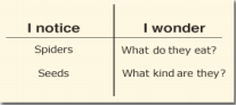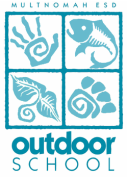Developing Inquiry Questions
At Outdoor School, students will be asked to participate in the process of conducting scientific inquiry. A meaningful inquiry experience prior to Outdoor School can greatly enhance students’ ability to fully engage in inquiry activities at Outdoor School. For this reason, you may choose to develop a class inquiry question to investigate before Outdoor School.
Or, you might use a class question to focus students’ studies at Outdoor School and finish investigating upon return to school. The ability to ask testable questions is a valuable skill for teachers to develop in their students in preparation for Outdoor School. Given the vast amount of new experiences, ideas, and observations children will be exposed to at Outdoor School, the ability to formulate and express questions will allow students to get the most out of their experience both at and after Outdoor School.
Before students generate questions to investigate, it is a good idea to have them review what they know, or think they know, about the topic under study. This focuses student interest and attention, reveals misconceptions, and allows the teacher to assess where the inquiry should or might lead. Students first begin to construct their learning using their prior knowledge of the topic and then inquire into areas that they do not yet understand. Using the “Investigating a Soil Ecosystem” activity can allow students to activate prior knowledge and begin making observations. The discussion questions at the end of the activity can aid in developing some questions students may have. The process of “K-WL” (K = What do I know? W = What do I want to know? L = What did I learn?) can also be used to generate initial student questions. An “I notice/I wonder” chart may also be a useful tool to complement an initial hands-on exploration of soil.

- providing examples of testable questions
- encouraging students to formulate their own questions and responding positively to students’ spontaneous questions
- providing materials that stimulate questions
- providing students with opportunities to explore information related to their questions
- providing students with feedback and the opportunity to change factual questions into testable questions or to generate new questions.
Kinds of Questions
Questions nearly always fall into one of three categories: questions that can be investigated, questions that can be answered by doing research (looking up the answers), and questions to which the answer is highly complex or not known. However, many questions that students phrase with a "why" can be restated so that they can be investigated. If you can turn the question into a "how would you?" or a "what would happen if?" question, it can usually be investigated. To turn questions, you need to do a "variables scan" (Harlen, 2001). That means breaking the big, complex "why" question into smaller, component parts. Variables, in this usage of the word, are individual aspects of the question that can be investigated through observation, measurement, or experimentation.
When considering which questions to investigate, you need criteria for what makes a question investigate-able in your classroom. Some criteria to consider are:
- Can the question be answered by making observations, collecting data, making measurements, changing variables?
- Can we narrow the question to look at a single variable?
- Do we have or can we acquire the necessary materials?
- Does the investigation fit the developmental level of the children?
Inquiry-based instruction is perhaps most appropriate when teaching concepts that do not conform to common student preconceptions or that require students to analyze discrepant information. Students tend to need more time to construct their understandings of abstract concepts than they need for more concrete information.
You can start to develop students’ ability to create their own testable inquiry questions by using the “Do You Have a Good Inquiry Question?” worksheet. This step would work best following a hands-on soil exploration session, followed by a reflective discussion and use of the “K-W-L” or “I notice/ I wonder” models.
Do You Have a Good Inquiry Question?
- What is the one question you are planning to investigate?
- What made you think of this investigation?
- Is the question interesting to you? Is it something you don’t already know the answer to?
- Can the question be answered by a comparison between two things? If so, what two things will you compare?
- Is it a testable question? Testable questions are answered through observations or experiments that provide evidence. Can you answer this question by designing a test, making observations, collecting data, and making comparisons between data? Describe the test you would use for this question, step-by-step:
- Do you have (or can you get) the materials to complete your investigation? Will you have enough time? List the materials you will need and how much time you think your investigation will take.
- Describe your hypothesis. What do you think will happen and why?

 RSS Feed
RSS Feed

